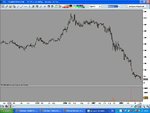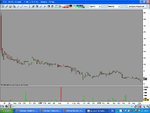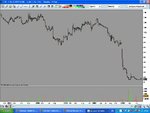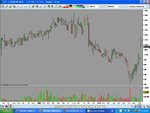So. We have UK banking and financial shares being propped up by laws that will basically stop them from 'going under'. Leaving aside the ethics either way for a moment. What we should be looking at is how can we make money out this situation?
32 listings are on the IG web site that you cannot short. Logically, buying these shares then you cannot lose. Or could you?
What about buying the shares that are almost rock bottom? Scoop up a few and just hold until the price goes up? They're a few listed going for the bargin price of less than50 quid.
Bradford and Bingley around 28.50.
European Islamic Investment bank. Going for less than 6p a share. (What a bargin).
And London Scottish Bank plc. Also going for less than 6p. (Double bargin).
The shorting rule stays in force until 16 January 2009. So running out Monday morning and buying bucket loads, holding until the day beore the rule lapses ('cause you know when it comes off the are going to fall like a stone) seems like a good plan.
As always, do your own due dilligence. They are cheap for a reason. Given that they are weekly charts. How long would you have to hold them before they climbed back up to a reasonable level? No one knows. Chances of a rapid climb to the skies? Unlikely.
What will probably happen is if they attain a reasonable level. The first area of resistance they run into is a very good area where those that bought and held many months ago, may take that first resistance spot as a good place for them to offload because they are offered a respite from the pain.
Only unusual buying activity (lots of it), has any chance of lifting these stocks.
Not looking too good for that idea then.
What about buying the higher priced shares then?
Admiral Group PLC. Trading around 995 a share. Doubled in price since Jan 2006.
The chart says, Hey, nice climb. But look at the large sideways channel it is in? And much inclined to meet major resistance selling at the 1000 mark.
Still, getting better though.
What about buying something that is already in an up trend and has a fair chance of carrying on? Better choice yes.
Rathbone Bros (RAT) 1,095 per share. Resistance at 1,100, which it is already at. Clearly broken out of it's down channel. With much better consistant buying volume coming in. Less chance of people already holding this stock rushing to off load it. Perceived possibly as a better 'value' stock to hold.
I'm not advocating buying as much as you can on Monday morning. (For one thing it has the resiastance to deal with). What I am saying is that cheap isn't always a bargin it may first appear to be.
Charts and fundamentals will tell you most of the story.
32 listings are on the IG web site that you cannot short. Logically, buying these shares then you cannot lose. Or could you?
What about buying the shares that are almost rock bottom? Scoop up a few and just hold until the price goes up? They're a few listed going for the bargin price of less than50 quid.
Bradford and Bingley around 28.50.
European Islamic Investment bank. Going for less than 6p a share. (What a bargin).
And London Scottish Bank plc. Also going for less than 6p. (Double bargin).
The shorting rule stays in force until 16 January 2009. So running out Monday morning and buying bucket loads, holding until the day beore the rule lapses ('cause you know when it comes off the are going to fall like a stone) seems like a good plan.
As always, do your own due dilligence. They are cheap for a reason. Given that they are weekly charts. How long would you have to hold them before they climbed back up to a reasonable level? No one knows. Chances of a rapid climb to the skies? Unlikely.
What will probably happen is if they attain a reasonable level. The first area of resistance they run into is a very good area where those that bought and held many months ago, may take that first resistance spot as a good place for them to offload because they are offered a respite from the pain.
Only unusual buying activity (lots of it), has any chance of lifting these stocks.
Not looking too good for that idea then.
What about buying the higher priced shares then?
Admiral Group PLC. Trading around 995 a share. Doubled in price since Jan 2006.
The chart says, Hey, nice climb. But look at the large sideways channel it is in? And much inclined to meet major resistance selling at the 1000 mark.
Still, getting better though.
What about buying something that is already in an up trend and has a fair chance of carrying on? Better choice yes.
Rathbone Bros (RAT) 1,095 per share. Resistance at 1,100, which it is already at. Clearly broken out of it's down channel. With much better consistant buying volume coming in. Less chance of people already holding this stock rushing to off load it. Perceived possibly as a better 'value' stock to hold.
I'm not advocating buying as much as you can on Monday morning. (For one thing it has the resiastance to deal with). What I am saying is that cheap isn't always a bargin it may first appear to be.
Charts and fundamentals will tell you most of the story.





